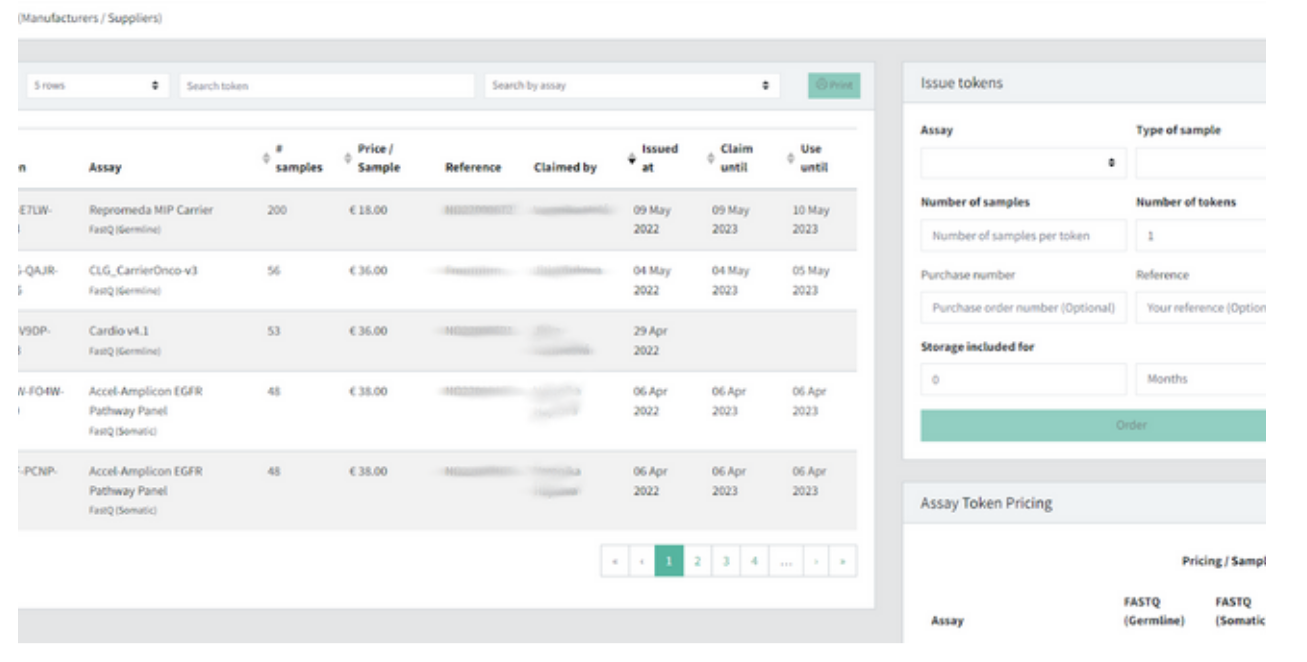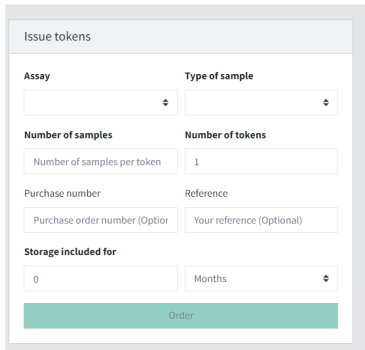Learn how to claim an analysis tokens and how to track its usage.
SSO platform and Account Administrator
Saphetor has developed an SSO platform on VarSome (sso.varsome.com) that can be used by the Account administrator of the distributor to facilitate the usage of VarSome.
To use this application, one unique user from the distributor must be defined as the Account Administrator. This user is set up by the Saphetor Billing Department.
Token Definition
Token is a form of pre-payment, an activation code for VarSome Clinical, which upon claiming, permits the client to analyze a certain number of samples belonging to a certain NGS assay.
Some tokens are for somatic analyses and some for germline analyses.
Tokens support only FASTQ files.
How to get a Token
Tokens are issued by our partners, mainly distributors and assay manufacturers. Get in touch to learn more.
Issue a token
At first, the token specifications for the user group must be set up by the Saphetor Support team (e.g. implementation of the token and setting up the group’s account to access specific assays on the Clinical back-end). Also, please note that for this to work, the Account Administrator of the distributor ordering the token with specific assays should have access to VarSome Clinical, because assays are fetched from the Clinical platform.
Once all of the above actions are completed, the Account Administrator of the distributor needs to follow the steps below to issue a token:
a) The account administrator go to sso.varsome.com and click on Billing menu:
b) Choose “Partners” button
c) Click on the screen “issue tokens”, type the assay and the type of sample (germline or somatic), the storage included in months, the number of samples and the number of tokens. Then, press order!
Print a Token and see all past token orders
On the next screen, as below, your token will appear, as well as all the tokens you have ordered so far. In the future, you will be able to print your tokens by pressing the button “print”.
On this screen, you will also be able to see all your token orders listed and filtered by assay.

Claim a Token
Claiming a token means activating it. A token must be claimed by the end customer in order for an analysis to be run.
A) Claim a Token in SSO
Any user from the end customer needs to log into sso.varsome.com, as it drives more accurate results than using the VarSome Clinical platform, and click on Labs. He/she will see all the tokens that have been purchased but not yet claimed. He/she can claim them by entering the token code on the Claim token window (on the right of the page) and hit the “Claim” button:

B) Claim a Token in VarSome Clinical platform
Any user needs to log into VarSome Clinical platform and click on the arrow that is next to the profiles' name and after that to choose the Claim Assay Token option.
Once you receive the token, you need to claim it, in order to activate VarSome Clinical for corresponding analysis.

Use the token to run an analysis in VarSome Clinical
Single Sample Analyses
Once a token is claimed no further action is needed in order to run analyses on VarSome Clinical. The platform however will validate whether a user attempting to run an analysis possesses non-expired tokens for the specific assay and sample type (germline fastq, somatic fastq) to be run.
Once an analysis is initiated the system will deduct from the token as many analyses as the ones initiated by the user. For example if a token allows a user to run 10 germline analyses from fastq and the user runs 6 analyses, 4 more analyses will be available for future use of the token.
Multi Sample Analyses
For multi sample analyses the same validation occurs as with single sample analyses.
Once a multi sample analysis runs, the system will decrease the number of analyses a user can run afterwards using a token by the number of samples participating in the multi sample analysis. For example, if a token allows a user to run 10 germline analyses from fastq and the user initiates a multi sample analysis from fastq files composed of 3 samples, 7 more analyses will be available for future use of the token.
Token Usage Tracking
Here you can find all tokens you have claimed, along with the number of analysis remaining for each of them and the number of analyses performed.
A) Token Tracking in SSO
The account administrator (from the distributor) or any end user must log in to the sso.varsome.com, as it drives more accurate results than using the VarSome Clinical platform, and click on the Partners tab.
All the tokens that have been bought will show on this page together with their actual status in remaining samples consumed, the price of the token/sample, the date of issue, the claiming date and the expiration date. There is also a price per sample list for all assays.

B) Token Tracking in VarSome Clinical
Tokens expiry dates (claim and samples analyses)
The tokens have 2 different expiry dates: one for the claim and one for the samples’ analyses.
- Token Claiming date: 12 months after the date of issue. This means that the end customer must claim the token within 12 months from the token’s issue date. If a token has not been claimed within 12 months after it was purchased, it will be lost.
- Analyses Expiry date: 12 months after the claiming date. This means that the token is valid for 12 months after it has been claimed. If some analyses linked to a token have not been used within 12 months after the token was claimed, they will be lost.A billing entry is generated upon token issuing, regardless of whether the token will be claimed by the client or not.
Tokens-supported pipelines
Tokens support only FASTQ files. They can be issued for either somatic or germline analyses. By default, somatic tokens include AMP classification, which triggers extra charges. If a customer doesn’t want to pay for this AMP classification, they must contact billing@saphetor.com to remove this default feature from the customer’s account.
Tokens cannot be issued as combined pipelines (somatic and germline).
When a token is used, it cannot be converted to another assay or another version of the same assay than the one it was already issued for. For example, if a customer has ordered a germline token, has claimed it and started to use it, it could not be converted into a somatic one, in case they realized that it was ordered by error. The only way that this could be done is before the token is used, ask the Saphetor team to delete it and issue a new token instead. In such a case, the fact that it was claimed doesn’t prevent the Saphetor team from deleting it.
Combined token analyses
Tumor normal analysis (paired analyses)
Tumor-normal analysis definition
The user has two different samples obtained from the same patient: a tumor sample and a "normal" (healthy) sample. The pipeline will report somatic variants observed only in the tumor sample.
For a tumor normal analysis, 2 tokens of the same assay must be used (a somatic token and a germline token) in conjunction, in order to obtain the desired results. The customer must buy both tokens (germline/somatic) of the same assay.
VarSome Premium for token-based customers
VarSome Premium is normally not available for commercial labs.If a token-based customer was exceptionally allowed to subscribe to both VarSome Premium and VarSome Clinical, it will not get any free monthly analyses on VarSome Clinical (up to the monthly value of the Premium subscription). The reason for this is that in the Customer billing platform, we set the monthly credit limit to zero to avoid analyses that would go beyond the token amount and hence create extra charges. On the other hand, a VarSome Clinical account as a Stand alone Solution is set up with no monthly balance limitation and this is why it can be perfectly combined with the VarSome Premium product which allows limited free access to VarSome Clinical up to the monthly value of the Premium user.
We developed the tokens solution mostly to answer distributors specific needs to bundle assays and analyses. These tokens have proved to be quite complex to handle, especially when they are used outside of the most common analyses. So please contact Saphetor for any non-standard request from a token-based account.

